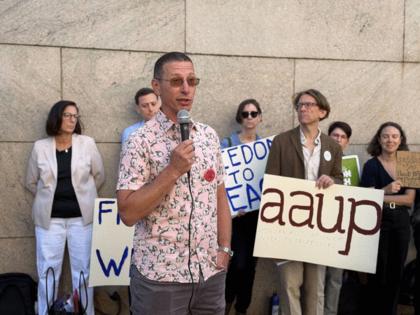Columbia University students return amid fear Trump antisemitism deal gives away too much
Published in News & Features
NEW YORK — Columbia University held its first day of classes for many students Tuesday amid fear the campus has been profoundly changed — both physically and academically — amid efforts to reach a deal with the Trump administration to restore federal research grants.
At a series of protests, faculty wondered aloud how the federal deal would change the semester ahead, with more than 100 professors taking a “syllabus pledge” to keep teaching controversial topics. Students lamented their difficulty accessing campus through limited entry points, where they are required to swipe ID cards to get in.
Columbia University agreed in July, as part of its deal with the Trump administration to restore federal research grants, to a hefty payout and mixed bag of institutional reforms over claims Columbia did not do enough to quell antisemitism.
“Along with many of my friends and colleagues here at Columbia, I’ve signed that pledge and put a statement in support of free inquiry onto my syllabus,” Peter Bearman, a sociology professor and director of the Incite Institute, said at a press conference by the local chapter of the American Association of University Professors.
“I’m assigning work on my syllabus that is seemingly forbidden under the new speech rules adopted at Columbia in response to Trump administration demands,” he continued, “because this is what we must do to combat and assault on our freedom.”
Foremost among the faculty’s concerns was that a new definition of antisemitism adopted by Columbia, which recognizes some criticism of Israel as discriminatory toward Jews, would chill academic freedom.
Since announcing the deal, Columbia has tried to push back against allegations that it gives away power to the federal government or threatens academic freedom on campus. Many of the reforms implemented were under consideration before President Trump took office, though now codified as part of the settlement and subject to review by an independent monitor.
“As Columbia’s resolution with the federal government makes clear, the government will not dictate what we teach, who teaches, or which students we admit,” Columbia spokesman Adam Stephan said in a statement.
“Our resolution was carefully crafted to protect academic freedom, freedom of expression, and open inquiry, values that define us as an institution. Importantly, the resolution also allows our essential research partnership with the federal government to resume work that is vital to the public interest.”
Stephan added that Columbia is evaluating campus access on an “ongoing basis” to balance student safety and reopening its grounds to the broader public.
Thanassis Cambanis, an adjunct international and public affairs professor, lived for six years in Lebanon before moving back to the United States in 2018. He saw similarities between his time abroad and today.
“When my kids were little in Beirut, they used to walk into school through a university campus that had bars at every gate and where you need a special ID to get in. And I told them, ‘This is not how it is in a free country. In a free country, anyone can walk through a campus, anyone can say anything they want on a campus,'” Cambanis said at the AAUP event.
“Today, here at Columbia, that’s no longer true.”
Cambanis teaches a course called Writing About War, including conflicts in Ukraine, Gaza and the West Bank, and Lebanon. But he feared the new definition of antisemitism would stifle class assignments or even subject some research to administrative or legal prosecution.
“I look at the definition of antisemitism published by the IHRA, which this university has embraced as an official guide, and I wonder, what is one allowed to teach?”
The adoption of the IHRA definition of antisemitism has already pushed some prominent Columbia academics to rethink their affiliations with the university. Among them was Rashid Khalidi, author of “The Hundred Years’ War on Palestine,” who publicly called off his Middle East history course in The Guardian but stopped by campus on the first day of classes.
“You can hold your nose for just so long,” Khalidi said after the rally. “It really stinks.”
In response to the backlash, Columbia has said it would continue to assess reports of discrimination on a case-by-case basis.
“We understand there is debate inside of our community, and more broadly, about this definition,” school officials wrote in an Aug. 4. memo. “Columbia’s consideration of this definition, as one of many factors used when considering complaints of discrimination, will strengthen our response to and our community’s understanding of modern antisemitism.”
A block away, Columbia faculty and students joined West Harlem residents in protesting the lack of campus access, which has also sparked a class-action lawsuit.
First-year graduate student Amara stumbled upon the demonstration while leaving campus, but stopped to join the protesters on her way. Amara has Hypermobile Ehlers-Danlos Syndrome and an artificial ankle. The daughter of a former Barnard College employee, Amara said she was used to an open campus. But when her brother tried to see campus, he was turned away because he registered as a guest within 24 hours of his visit.
“I personally am just really annoyed with the whole thing,” Amara said. “I think it’s stupid how hard it is to get to class.”
_____
©2025 New York Daily News. Visit nydailynews.com. Distributed by Tribune Content Agency, LLC.







Comments